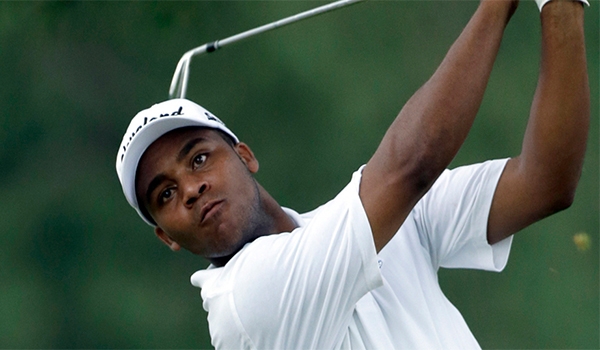Let’s get something out of the way: I’m black.
Damn, glad I got that off my chest.
I mean, you would think I didn’t know it by the amount of times I’m asked about my race. It’s actually kind of comical at this point in my career … I know exactly when the questions are coming and what’ll be asked.
“What’s it like being the only black guy on Tour?”
“Does it feel lonely as the only African-American out there?”
And my all-time favorite one:
“Do you think we’re growing the game enough for African Americans?”
Well, hell no, and that’s a silly question, too. Because we’re not growing the game enough for Hispanics, Whites, Asians and African-Americans alike. It’s about giving everyone an opportunity, not just African-Americans. But I’m gonna get back to that a little later.
If you know me, you know I’m not afraid to say what’s on my mind (just hit me up on Twitter for that). But I’m also realistic about my views, which is why I want to acknowledge the double-edged sword here. The primary reason people know me is that I’m black. I’m not afraid to say that. Maybe I’ll get a bit more media coverage or be seen as the guy who can change the way the Tour is perceived. Being black has helped me, no doubt.
On the other hand, from when I first started playing golf at a high level, I was seen as the good black golfer — not just a good golfer. Even though my primary goal is to be the best golfer on the PGA Tour, and even though I have the same goals as any of the top players, I’m often labeled as that guy. You know … the black guy who isn’t Tiger. Trust me, I hear it.
But out here on Tour, I want to be known as a winner. After I won the Australian PGA Championship this December to capture my first professional victory, that’s how the Australian media treated me.
These people do know I’m like every other Tour player out here, right?
That was legit, man. Your boy beat some hometown favorites including Adam Scott. So when I talked to the media in my press conference and in private interviews, all they wanted to know about was how my victory was going to propel my career, how it felt to be a first-time winner — things like that. They were normal questions. And to the best of my knowledge, I don’t recall being asked one time about my race.
I noticed real quick that the tone in the Australian media was different from anything I had ever encountered in America. They saw me as the goofy dude who worked his ass off to win one of their most prestigious tournaments … not someone who could be used to create a race discussion. I know Australia has its own complicated racial history, but the disparity was clear to me.
Back in the States, every damn article seemed to whittle me down to that old label: The black golfer. I read those stories and thought, These people do know I’m like every other Tour player out here, right? What’s my skin color got to do with any of it?
Read more at the ThePlayersTribune.com



